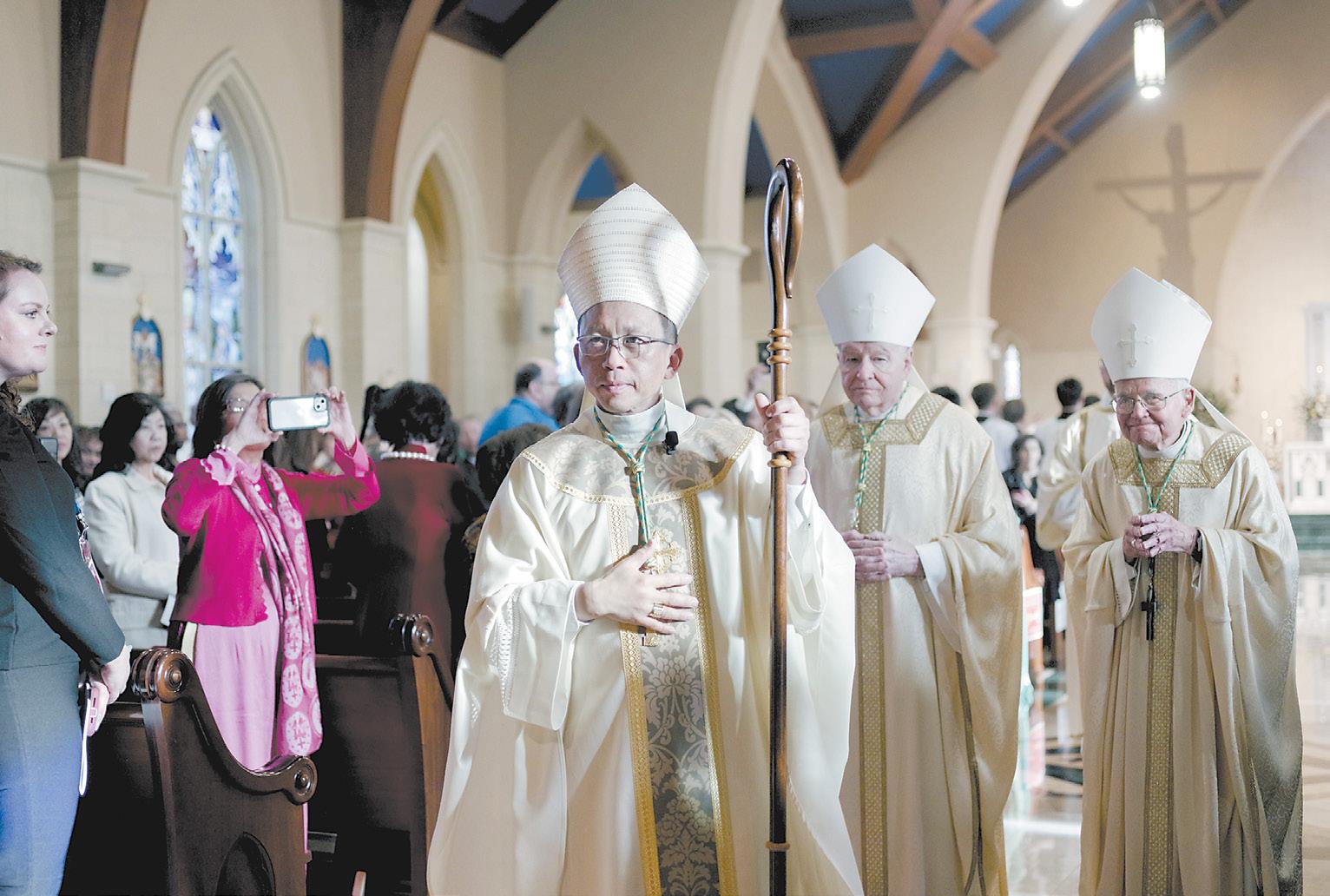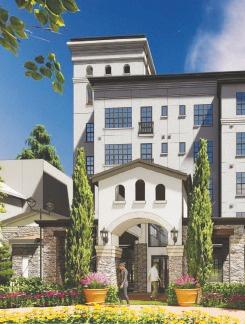
8 minute read
Our nation Vietnamese priest ordained auxiliary bishop for Atlanta
from Feb. 3, 2023
NICHOLE GOLDEN
OSV News
Advertisement


ROSWELL, Ga. — “God will provide,” is the episcopal motto of Atlanta’s newest auxiliary, Bishop John Nhan Tran, ordained Jan. 23 in a joyous afternoon Mass at St.
Peter Chanel Church in Roswell, Georgia.
Bishop Tran most recently served as pastor at Mary Our Queen Church in Mandeville, Louisiana, in the Archdiocese of New Orleans. Many members of his congregation made the trip to witness the ordination.
Pope Francis appointed then-Father Tran to serve Atlanta in October. Archbishop Christophe Pierre, apostolic nuncio to the United States, read the apostolic letter as part of the Rite of Ordination.
“Bishop-elect Tran has distinguished himself in the Archdiocese of New Orleans, especially as a pastor,” read the nuncio, as reported by The Georgia Bulletin, publication of the Archdiocese of Atlanta.
His “personal story is quite moving,” noted Archbishop Pierre.
Bishop Tran was born in 1966 in Vietnam. He and his family left their country amid the ravages of war and received refugee status in the United States. The bishop’s mother died when he was 2 years old, his father was shot and imprisoned by communists, and a brother died after stepping on a land mine.
“Throughout his life and ministry he has shown remarkable patience and perseverance, and maintained his faith in God. His life experience has prepared him for this point, and the Divine Master has been shaping and forming him even through suffering into a masterpiece,” said Archbishop Pierre.
Bishop Tran is now one of two Vietnamese-American bishops serving the U.S. Catholic Church. Bishop Thanh
Thai Nguyen is an auxiliary bishop in the Diocese of Orange, California. The nuncio noted that Bishop Tran’s ordination is “also a sign of the great diversity in the Archdiocese of Atlanta and the rich contribution of the Vietnamese faithful here.”
The Office of Planning and Research for the Archdiocese of Atlanta estimates that 50,000 Vietnamese-Americans live in the metro area.
In his homily, Archbishop Gregory J. Hartmayer, OFM
Atlanta’s newest auxiliary, Bishop John Nhan Tran, greets the faithful after his episcopal ordination Mass at St. Peter Chanel Church in Roswell, Ga., Jan. 23. Processing behind him are Archbishop Gregory M. Aymond of New Orleans, and retired Archbishop Alfred C. Hughes of New Orleans.
Conv., expressed gratitude for the gift of a new auxiliary bishop and reflected on the spirit of rejoicing in Atlanta, New Orleans and the land of Vietnam. The ordination, noted the archbishop, was taking place during the celebration of Tet, the Vietnamese New Year.
Just as God gave the prophet Jeremiah the strength to speak the truth, He will aid Bishop Tran, said the archbishop.
“God has called you to shepherd His people. The consolation is that when God calls us He also equips us. He gives us everything we need to succeed in our mission of serving Him. To whomever I send you, you shall go – even to Atlanta,” he said as the congregation laughed.
“The deepest identity of a bishop is to be a companion of Jesus Christ,” said Archbishop Hartmayer. Prayer is essential in shaping the daily life of a bishop, he instructed.
“Without prayer, we lose our focus and our true sense of purpose. My dear brother John, you are a man of prayer. Therein, lies your strength,” said the archbishop.
Following the homily, Bishop Tran promised to faithfully carry out the Office of Bishop, was anointed with sacred chrism, and was invested with the signs of the office –the ring, miter and crosier. Co-consecrators of the ordination were New Orleans Archbishop Gregory Aymond and Archbishop-emeritus Alfred Hughes. They joined Bishop Tran for the Te Deum (“We praise you, Oh God”). The archdiocesan choir beautifully chanted the Te Deum from the choir loft of the Roswell parish as the bishop made his way down the center aisle of the sanctuary, blessing the people.
The new bishop spoke at the conclusion of Mass.
“I am humbled by your presence, and my heart is filled with profound gratitude,” he said.
Bishop Tran gave thanks to the bishops attending, former parishioners, family and organizers of the Mass and for those watching the ticketed Mass by livestream.
“May God bless each of you as you have blessed me today,” said Bishop Tran.
New translation tweaks to sacrament of penance take effect this Lent
GINA CHRISTIAN OSV News
The experience of the sacrament of penance in the Roman rite will be slightly different this Lent, thanks to approved changes in the English translation set to take effect in a few weeks. Starting Ash Wednesday – which takes place this year on Feb. 22 – the prayer of absolution will include three modifications, so that the revised version will read as follows:
“God, the Father of mercies, through the death and resurrection of His Son has reconciled the world to Himself and poured out [formerly “sent”] the Holy Spirit for [previously “Holy Spirit among us for”] the forgiveness of sins; through the ministry of the Church may God grant [instead of “give”] you pardon and peace.
And I absolve you from your sins in the Name of the Father, and of the Son, and of the Holy Spirit.”
The new text was adopted by the U.S. Conference of Catholic Bishops during its Spring 2021 meeting, with the Vatican’s Dicastery (then-Congregation) for Divine Worship and the Discipline of the Sacraments approving the text in April
2022. As of April 16, 2023, the Second Sunday of Easter known also as Divine Mercy Sunday, the revised formula for absolution is mandatory.
“The essential part of the absolution formula has not changed,” said Father Andrew Menke, executive director of the USCCB’s Secretariat for Divine Worship, during an Oct. 25, 2022, webinar cosponsored by his office and the Federation of Diocesan Liturgical Commissions.
During his presentation, Father Menke admitted the bishops had debated whether the minor changes were worth undertaking. However, he said the consensus favored striving for a more accurate translation from the Latin. Father Menke noted penitents “who can be a little scrupulous” might panic if priests -- many of whom “have said this prayer literally thousands of times” – inadvertently use the old form of absolution.
“They might be concerned (that absolution) doesn’t count,” he said. Yet he stressed that “the heart of the sacrament” remains intact, and the absolution is still valid.
While not a major alteration, the update to the text nonetheless offers “a wonderful opportunity to reiterate and teach the importance of the sacrament of penance as a staple for living the Christian life,”
Father Dennis Gill, director of the Office for Divine Worship at the Archdiocese of Philadelphia, told OSV News ahead of a Jan. 31 webinar he plans to give on the topic. “It’s also a wonderful opportunity to catechize about the sacrament itself.”

Father Menke noted in his October 2022 webinar that the updates are part of a broader effort by the Vatican to ensure accuracy in the translation of liturgical texts.
“It’s not due to anything against the Latin texts,” he said. “It’s based on the fact that the Holy See instructed the bishops of the world at the beginning of the 21st century that our translations needed to be more accurate.”
Liturgical texts have been revised throughout Church history under papal direction: St. Pius V modified both the breviary and the missal in response to the Council of Trent, while St. Pius X, Pope Pius XII and St. John XXIII, who convened the Second Vatican Council, all significantly furthered such efforts.
Noting several difficulties in the practical application of Vatican II’s liturgical reforms, St. John Paul II stated in his 1998 apostolic letter “Vicesimus Quintus Annus” the need “to remedy certain
Over Catholic protests, Minnesota lawmakers pass right to abortion law, send to governor
ST. PAUL, Minn. — In a party line vote, Democrats in the Minnesota Senate passed a bill 34-33 in the early morning hours of Jan. 28 to place a right to abortion for any reason and without a limit on viability into state law. The House approved the measure Jan. 19 and Gov. Tim Walz, a Democrat, was expected to sign the bill into law. Pro-life and pro-abortion advocates gathered in large numbers outside the Senate chambers at the State Capitol in St. Paul shortly before the debate began about noon Jan. 27. In that debate, which stretched over 15 hours, Democrats rejected multiple Republican amendments to the Protect Reproductive Options, or PRO Act, before the final vote on Jan. 28.
Washington state bishops condemn ‘extreme’ abortion constitution proposal

SEATTLE — A proposed amendment to Washington’s constitution that would allow the “right” for an abortion to be performed “at any point” up to the birth of a baby is an “extreme proposal” that lawmakers must reject, said the state’s five Catholic bishops. The Senate-House
Joint Resolution ignores the right to life of an unborn baby, they said in a Jan. 24 statement.
The proposal goes far beyond what current state law allows on abortion: It is legal only until the point of viability of the unborn child.
“As Catholics we must take this opportunity to speak up for the unborn and in support of life,” the bishops said, encouraging Catholics to contact the governor and state legislators.
“We must state what we believe is the heart of God on behalf of those who cannot defend themselves.”
With national March for Life behind them, pro-life advocates plan for state marches, rallies
WASHINGTON, D.C. — With the national March for Life in the nation’s capital marking the Roe v. Wade anniversary behind them, pro-life advocates are gearing up for March for Life events in a number of states in the months ahead. With its Dobbs v. Jackson Women’s Health Organization ruling June 24, the U.S. Supreme Court returned the issue of abortion to the states in overturning its 1973 Roe ruling that legalized abortion nationwide. Roe “was an act of judicial activism – stealing the rights of the states to democratically decide the issue of abortion,” the March for Life organization in Washington said in a statement. “With the end of Roe, comes a return of power to the states. By marching in our states, we show our local leaders that we the people want protective, life-affirming laws for both the unborn and their mothers.” To date, marches have been planned in these state capitals: Richmond, Virginia, Feb. 1; Phoenix, Feb. 23; Sacramento, California, March 6; Harrisburg, Pennsylvania, Oct. 16; and Lansing, Michigan, Nov. 8.
Trev s a new sen o v ng commun y com ng to Nor heas Char ot e n spr ng 2023 Des gned o sui near y a your needs we w l o fer eve y h ng o you o ve he ifesty e you wan rom chef-p epa ed mea s to beaut u y des gned apartmen s A w th he peace o m nd o ma ntenance-free l v ng defects or inaccuracies, to complete partial translations … (and) to ensure respect for the texts approved.”
The 2001 document “Liturgiam authenenticam,” issued by the Vatican’s then-Congregation for Divine Worship and the Discipline of the Sacraments, developed the scope of the project, which first resulted in the 2011 full retranslation of the Roman Missal.
Since then, “we’ve dutifully been going through the books one by one with the assistance of ICEL (the International Commission on English in the Liturgy) and preparing new editions of these books,” said Father Menke in his presentation. New English translations of liturgical books have been completed for confirmation (2015), matrimony (2016), exorcism (2017), the dedication of a church (2018), the blessing of oils (2019), the baptism of children (2020) and ordination (2021).
The updates do not imply that “the (older versions) are heretical,” Father Menke said Jan. 30. “It’s just that Church authorities have determined we might do better.”
The translation process is rigorous, with opportunities for bishops to review and reconsider the proposed updates, he added.








